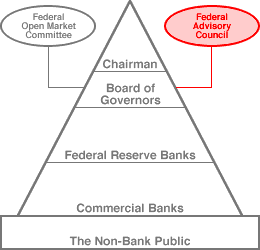
|
|
BENEFIT-COST ANALYSIS: An analytical technique that compares the benefit generated by an activity with its opportunity cost of production. The rule is that if benefits exceed costs, then the activity is efficient and should be undertaken. In some cases the end result of benefit-cost analysis is net benefits, which is benefits minus cost. A positive value means the activity is efficient. In other cases the end result of benefit-cost analysis is a benefit-cost ratio, which is benefits divided by costs. A ratio greater than 1.0 is thus the indication of an efficient activity.
Visit the GLOSS*arama
|
|


|

|
                           FEDERAL ADVISORY COUNCIL: A support committee of the Federal Reserve System that provides advice and input the Federal Reserve Board of Governors. The Federal Advisory Council (FAC) is comprised of 12 members, one from each of the 12 Federal Reserve Districts. The council members, typically commercial bank presidents from the 12 districts, are appointed by their Federal Reserve District Banks. The FAC is one of three Federal Reserve Board advisory committees. The other two Consumer Advisory Council and Thrift Institutions Advisory Council. The Federal Advisory Council (FAC) is an advisory support committee to the Federal Reserve Board of Governors. It has no policy making authority but serves to provide "grassroots" feedback and advice on any and all issues relevant to the Federal Reserve System. The council contains 12 members, appointed by the 12 Federal Reserve District Banks. The appointees are typically the presidents of commercial banks within their respective districts. The FAC meets with the Federal Reserve Board in Washington, D.C. at least four times a year, generally the first Friday in February, May, September, and December.| Federal Advisory Council |  |
The exhibit to the right, commonly termed the Federal Reserve pyramid, indicates the connection between the Federal Advisory Council and the rest of the Federal Reserve System. The Federal Advisory Council is connected directly to the Federal Reserve Board of Governors at the top of the pyramid.The Federal Advisory Council is a reflection of the basic design of the Federal Reserve System as a decentralize central bank. While the FAC has no explicit policy making authority, feedback from the council helps to keep Fed actions somewhat grounded in the "real world." While input from 12 commercial bank presidents is not quite as grassroots as a council populated by factory workers and retail sales clerks, it is better than nothing at all. Commercial bank presidents living and working places like Des Moines (Iowa), Flagstaff (Arizona), and Memphis (Tennessee) can give insight into Fed policies not found in New York City or Washington, D.C. Two additional advisory councils provide the Federal Reserve Board with advice and feedback on specific areas of Federal Reserve activity--Consumer Advisory Council and Thrift Institutions Advisory Council. - Consumer Advisory Council: Advice on credit consumer protection activities of the Federal Reserve Board is offered by this council of 30 members. The Consumer Advisory Council (CAC) was established in 1976 and contains members who represent consumers and financial groups, including both academicians and legal specialists with knowledge of consumer affairs. Members serve staggered 3 year terms. The council meets with the Federal Reserve Board three times a year
- Thrift Institutions Advisory Council: This advisory council was established in 1980 when the Federal Reserve System extended regulatory oversight to thrift institutions (savings and loan associations, credit unions, and mutual savings banks). The Thrift Institutions Advisory Council (TIAC) contains 12 members, each serving for 2 years, who represent the interests of savings and loan associations, credit unions, and mutual savings banks. The council meets with the Federal Reserve Board 3 times a year to discuss the special needs and concerns of thrift institutions.

Recommended Citation:FEDERAL ADVISORY COUNCIL, AmosWEB Encyclonomic WEB*pedia, http://www.AmosWEB.com, AmosWEB LLC, 2000-2025. [Accessed: July 18, 2025].
Check Out These Related Terms... | | | | | | | | | | | | | | |
Or For A Little Background... | | | | | | | | | |
And For Further Study... | | | | | | | | | | | |
Related Websites (Will Open in New Window)... | |
Search Again?
Back to the WEB*pedia
|



|

|
RED AGGRESSERINE
[What's This?]
Today, you are likely to spend a great deal of time at a flea market wanting to buy either a weathervane with a cow on top or a box of multi-colored, plastic paper clips. Be on the lookout for telephone calls from long-lost relatives.
Your Complete Scope
This isn't me! What am I?
|

|
|
One of the largest markets for gold in the United States is the manufacturing of class rings.
|

|
|
"A winner is someone who recognizes his God-given talents, works his tail off to develop them into skills, and uses those skills to accomplish his goals. " -- Larry Bird, basketball player
|

|
DSE
Detroit Stock Exchange
|

|
|
Tell us what you think about AmosWEB. Like what you see? Have suggestions for improvements? Let us know. Click the User Feedback link.
User Feedback
|


|


